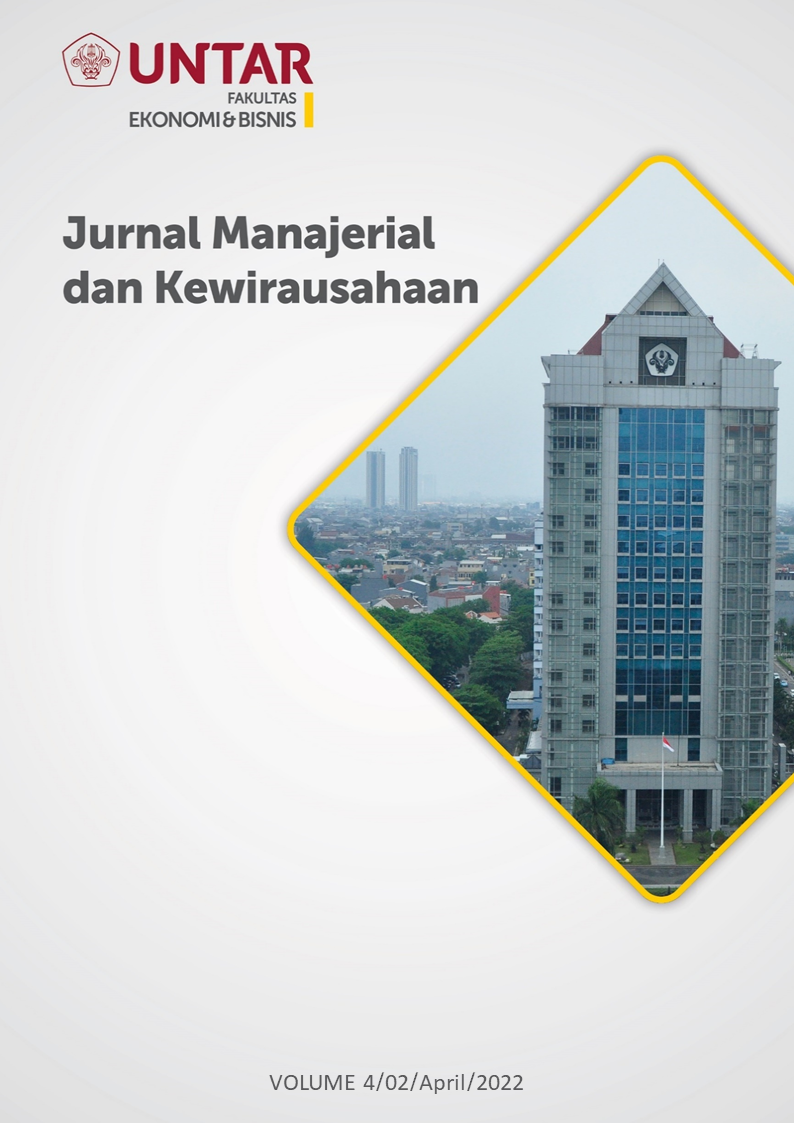Pengaruh Financial Knowledge, Financial Self-Efficacy, dan Risk Perception terhadap Investment Intention di Pasar Saham
Main Article Content
Abstract
Tujuan penelitian ini adalah untuk menganalisis apakah 1) pengetahuan keuangan dapat mempengaruhi niat investasi; 2) efikasi diri dapat mempengaruhi niat investasi; 3) persepsi risiko dapat mempengaruhi niat investasi. Sampel diperoleh dengan metode purposive sampling dengan total 283 responden di Jabodetabek dan dianalisa dengan SmartPLS 3.0.0. Hasil penelitian ini menunjukkan bahwa pengetahuan keuangan, efikasi diri, dan persepsi risiko memiliki pengaruh yang signifikan terhadap niat investasi.
The purpose of this study is to analyze whether 1) financial knowledge can affect investment intentions; 2) self-efficacy can affect investment intentions; 3) the perception of risk can affect investment intentions. The sample was collected by purposive sampling method with a total of 283 respondents in JABODETABEK and analyzed using SmartPLS 3.0.0. The results of this study show that financial knowledge, self-efficacy, and risk perception have a significant influence on investment intentions.
Article Details
Section
This work is licensed under a Jurnal Muara Ilmu Ekonomi dan Bisnis Creative Commons Attribution-ShareAlike 4.0 International License.,/p>
References
Adiputra, I. G., & Patricia, E. (2020). The Effect of Financial Attitude, Financial Knowledge, and Income on Financial Management Behavior. Advances in Social Science, Education and Humanities Research. https://dx.doi.org/10.2991/assehr.k.200515.019
Ajzen, I. (1991). The Theory of Planned Behavior. Organizational Behavior and Human Decision Processes, 50(2), 179-211. https://doi.org/10.1016/0749-5978(91)90020-T
Aren, S., & Hamamci, H. N. (2020). (2020). Relationship between risk aversion, risky investment intention, investment choices: Impact of personality traits and emotion. Kybernetes.
Coskun, A., & Dalziel, N. (2020). Mediation effect of financial attitude on financial knowledge and financial behavior: The case of university student. International Journal of Research in Business and Social Science, 9(2), 1-8. http://dx.doi.org/10.20525/ijrbs.v9i2.647
Dewi, V., Febrian, E., Effendi, N., & Anwar, M. (2020). Financial Literacy among the Millennial Generation: Relationships between Knowledge, Skills, Attitude, and Behavior. Australasian Accounting, Business and Finance Journal, 14(4), 24-37.
F. Hair Jr, J., Sarstedt, M., Hopkins, L. and G. Kuppelwieser, V. (2014), "Partial least squares structural equation modeling (PLS-SEM): An emerging tool in business research", European Business Review, Vol. 26 No. 2, pp. 106-121. https://doi.org/10.1108/EBR-10-2013-0128
Fornell, C., & Larcker, D. (1981). Evaluating Structural Equation Models with Unobservable Variables and Measurement Error. Journal of Marketing Research, 18(1), 39-50. https://doi.org/10.1177/002224378101800104
Ghozali, I., & Latan, H. (2015). Partial Least Squares: Konsep, Teknik dan Aplikasi SmartPLS 2.0 M3. Badan Penerbit Universitas Diponegoro.
Hair, J.F., Sarstedt, M., Ringle, C.M. et al. (2011). An assessment of the use of partial least squares structural equation modeling in marketing research. J. of the Acad. Mark. Sci. 40, 414–433 (2012). https://doi.org/10.1007/s11747-011-0261-6
Kurniawan, P. I. (2021). Effect of expected return, self efficacy, and perceived risk on investment intention. an empirical study on accounting master degree in Udayana University, Bali.
Marsh, B. (2006). Examining the Personal Finance Attitudes, Behaviors, and Knowledge Levels of First-Year and Senior Students at Baptist Universities in the State of Texas. Bowling Green State University.
Mindra, R., & Moya, M. (2017). Financial self-efficacy: a mediator in advancing financial inclusion. Equality, Diversity and Inclusion: An International Journal, 36(2), 128-149. https://doi.org/10.1108/EDI-05-2016-0040
Natsir, K., Arifin, A. Z. & Bangun, N. (2021). The Influence of Product Knowledge and Perceived Risk on Investment Intention of Stock Investors in the Covid-19 Pandemic Era. International Conference on Economics, Business, Social, and Humanities (ICEBSH) (pp. 1-7). https://doi.org/10.2991/assehr.k.210805.074
Rai, K., Dua, S., & Yadav, M. (2020). Association of financial attitude, financial behaviour and financial knowledge towards financial literacy: A structural equation modeling approach. FIIB Business Review, 8(1), 51-60.
Tang, N., & Baker, A. (2016). Self-esteem, financial knowledge, and financial behavior. Journal of Economic Psychology, 54, 164-176. https://doi.org/10.1016/j.joep.2016.04.005
Wang, A. (2009). Interplay of Investors' Financial Knowledge and Risk Taking. Journal of Behavioral Finance, 10(4), 204-213. http://dx.doi.org/10.1080/15427560903369292
Wangi, L., & Baskara, I. (2021). The Effect of Financial Attitude, Financial Behavior, Financial Knowledge, And Sociodemographic Factors On Individual Investment Decision Behavior. American Journal of Humanities and Social Sciences Research (AJHSSR), 519-527.
Washington, M., Shirley, E., Lisset, G., & Regina, R. (2015). Students’ perceived risk and investment intention: The effect of brand equity. Management and Marketing, 10(3), 208-225.

